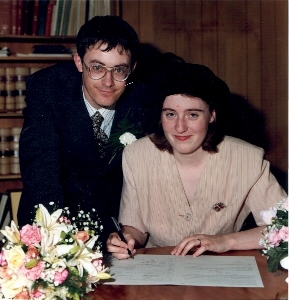
I’ve been ill with cerebral vasculitis for a very long time. I was only 22 in 1994, had newly started a full-time funded science PhD. And I started to get ill, often nauseous and vomiting, battling severe fatigue, falling over, problems with my legs etc. Initially I was diagnosed with ME, but the symptoms changed over time to look more like multiple sclerosis. My vision and hearing became badly affected, I couldn’t control my bladder properly and had to wear incontinence pads permanently and sprint to the bathroom.
I had to leave the science PhD, unable to put in the hours needed, but it prompted me to fight for a proper diagnosis. I had to fight at hospital level too, arguing with the consultant, and saying why I thought the ME diagnosis was wrong. He agreed to do a brain scan, but didn’t think it would show anything. Wrong! There were multiple lesions in my brain, which should never be there in the brain of someone so young. He was shocked.
I was just relieved that finally something was showing up and I might be close to a new diagnosis. I had a raft of new tests, most on 5th November 1997.
I remember coming home, in agony after a rather botched lumbar puncture, to the sound of fireworks and smell of bonfires. And I was re-diagnosed with cerebral vasculitis. It’s in the small blood vessels in my brain, and is very similar day to day to multiple sclerosis.
My main symptoms are mobility, bladder incontinence, memory/cognitive problems, fatigue, and losing control of my arms and legs. However I also have problems with vision, hearing, speech, falling over, headaches (though not until a few years ago), sleeping for up to 17 hours day after day, etc. I always use one stick, often two, and have had my own manual wheelchair since the late 1990s.
Treatment-wise my disease has not behaved nicely. I didn’t have Cyclophosphamide early on because I was newly married and hoping to have children, and though I said “Just give me the treatment!” the consultant was very concerned about fertility concerns. More recently it was ruled out again because it might worsen my very severe (off the urologist’s scale) bladder problems. But I finally tried it in summer 2012. I was very sick on it, on one day 20 times over a 12 hour period. Initially it didn’t look as though it helped. My inflammation markers reached record levels on it. However with a longer term view it may have done more good than we first thought, and I’ve since been able to drop one of my multiple immunosuppression drugs, and am successfully lowering my steroids. Over the years I’ve tried Azathioprine, Ciclosporin, Mycophenolate Mofetil, Methotrexate, Thalidomide, and of course steroids. And I’m still on quite a cocktail.

So there are downsides. But I think there are also positives. The main one is that I’m happy, despite everything. My memory problems really help with this. Each day is like a fresh start, and I take pleasure in the small things. For example I recently took up digital photography and am enjoying getting out and about to take pictures. Also, and perhaps most importantly of all, I have a wonderful husband, who I married aged 22 shortly before the disease started. He has stuck by me throughout everything that has happened. He’s a gem.
And I’ve been able to continue studying. After leaving the computer science PhD I started studying history with the Open University part-time in 1998. I was finding my new immunosuppression treatment horrific, being very nauseous every day on Azathioprine. I needed something positive to take my mind off it. So I signed up for one OU course. And that led to another course, and another, and soon, partly helped by my existing science degree and credit transfer, I had a new history degree. And then, still part-time, I went on to study a history Masters at my local university, followed by trying for a PhD again, researching reading habits in Scotland circa 1750-1820. I completed the PhD in early 2010. It wasn’t easy: by the end I was managing on no more than five hours total a week, in one hour chunks spread throughout the week. But I did it. I got shingles in the weeks before my viva, the final oral exam PhD students must go through. That probably took my mind off the viva, but it wasn’t the best timing in the world!
I can’t work with my disease. I’m severely disabled from the cumulative brain damage over the years. But I’ve been awarded an honorary research fellowship by my university, and that’s helping me slowly turn my research and my PhD thesis into more academic journal papers. That’s very rewarding, and I recently had one paper published in the most eminent Scottish historical academic journal. To have a single-authored paper in that journal only two years post PhD would be a big achievement for any academic historian, but for me given my health circumstances and disability it’s massive. I’m also planning new research, bringing records to me to work on at home, and hope to enjoy doing this for a long time to come.
Viv Dunstan – March 2013
You may also like to see the Individual Disease page on CNS/Primary Angiitis of the CNS
Viv’s story was updated in January 2016
